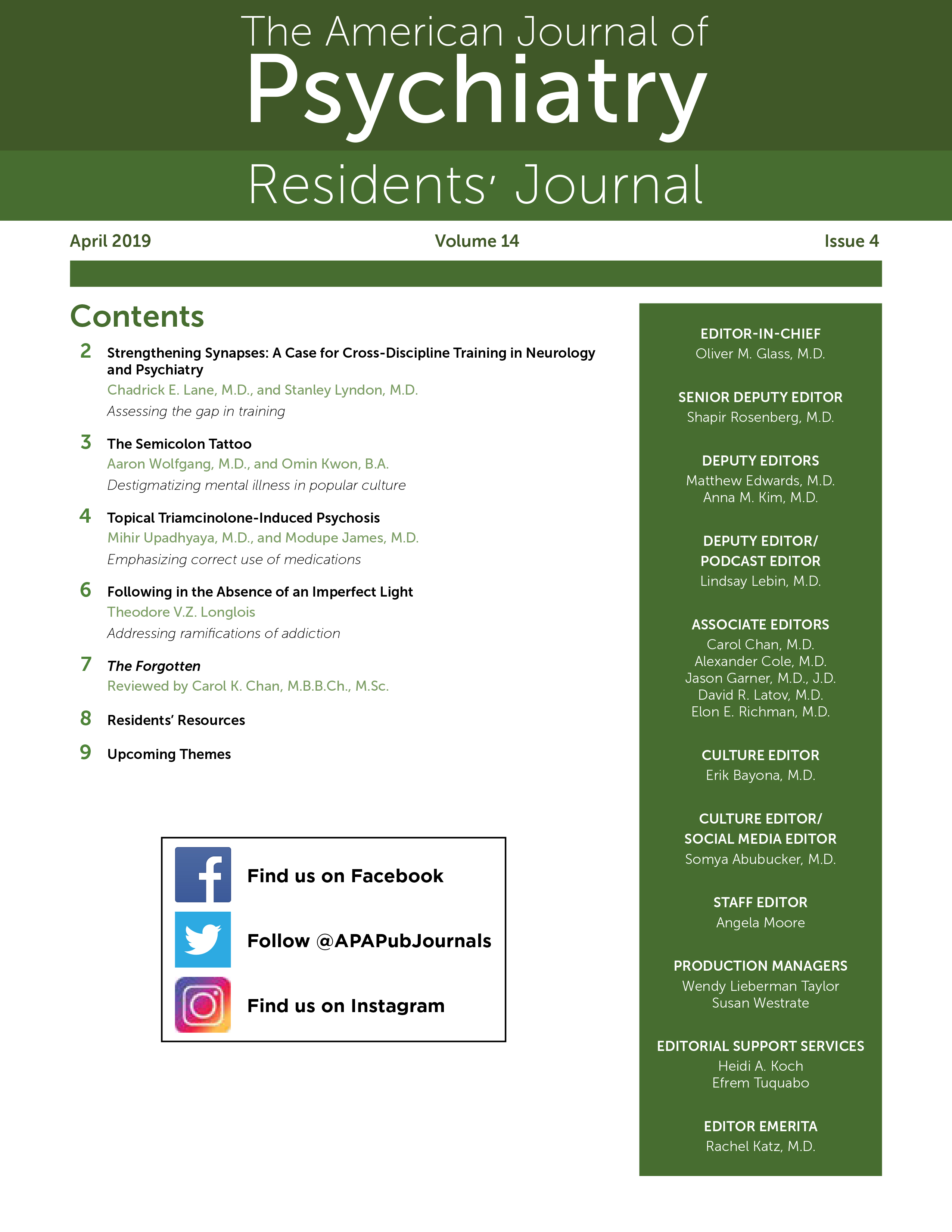Strengthening Synapses: A Case for Cross-Discipline Training in Neurology and Psychiatry
Neuropsychiatry has a long, illustrious history, with pioneers such as Pierre Paul Broca, who fostered the idea of the localization of brain function, and Norman Geschwind, who introduced the concept of disconnection syndromes. The healer of the mind and the brain began as one and the same. Jean-Martin Charcot, a neurologist, is perhaps better known for his interests in hypnosis and conversion disorders than for being the first person to describe multiple sclerosis. And one cannot forget Charcot's famed pupil, the neurologist turned father of psychoanalysis, Sigmund Freud, who initially sought a neurobiological basis of the mind before ultimately settling on his model of psychosexual development (1). The distinction between disorders that are considered psychiatric versus ones that are neurologic has become increasingly arbitrary as neuroscience continues to etch out the biological mechanisms of once intangible mental phenomena.
The approaches of neurology and psychiatry have been wedded in combined neurology-psychiatry residencies, geriatric psychiatry fellowships, and, more recently, in behavioral neurology and neuropsychiatry fellowships. Several diseases that affect the brain are associated with cognitive as well as emotional and behavioral symptoms and therefore are best thought of as neuropsychiatric disorders. Alzheimer's disease, for example, can cause amnesia, agnosia, aphasia, and apraxia, although also can result in depression, agitation, and psychosis (2).
Neuropsychiatry largely aims to understand brain-behavior relationships in the service of diagnosing and treating patients. However, there is a dearth of shared learning between neurology and psychiatry residents at most U.S. graduate training programs, with many psychiatrists having only 2 months of experience in neurology across their entire 4 years of general residency. It is even more dire for trainees in neurology, with the Accreditation Council for Graduate Medical Education requiring only 1 month on a psychiatry service. Some have proposed varying degrees of uniting the two, ranging from increased opportunities for mutual learning to completely reuniting into a singular specialty (3, 4).
Our concern with complete reunification is one of time: expanding beyond the 4 years of residency training will likely deter applicants at a moment when demand far exceeds supply. However, we strongly believe there is a need for more neuroscience within psychiatric curricula and vice versa. We propose a two-pronged solution: integrating didactic curricula and building longitudinal clinical experiences. The National Neuroscience Curriculum Initiative, a free online platform for shared and experiential learning, has brought clinical neuroscience to a broader audience in graduate medical training (5). This, and similar resources, can serve as a foundation for regular case conferences and problem-based learning. To further hone bedside neuropsychiatric skills, trainees will need a cross-discipline clinical thread spanning the entirety of residency, embedding themselves within services tailored toward patients with disorders of cognition, emotion, or behavior.
It has become clear that brain circuitry does not distinguish between neurological or psychiatric domains and neither should practitioners. We hope further discussion of this gap in training will persuade residency programs, as well as professional organizations, to consider opportunities in clinical neuroscience that will enable us to best care for the millions of people affected by neuropsychiatric illness.
1. : A project for a scientific psychology (1895), in The Standard Edition of the Complete Psychological Works of Sigmund Freud, London, 1953, 283–397 Google Scholar
2. : The prevalence of neuropsychiatric symptoms in Alzheimer's disease: systematic review and meta-analysis. J Affect Disord 2016; 190:264–271 Crossref, Google Scholar
3. : Neurology and psychiatry: closing the great divide. Neurology 2000; 54:8–14 Crossref, Google Scholar
4. : Do psychiatry and neurology need a close partnership or a merger? BJPsych Bull 2015; 39:105–107 Crossref, Google Scholar
5. : Integrating a neuroscience perspective into clinical psychiatry today. JAMA Psychiatry 2017; 74:313–314 Crossref, Google Scholar



